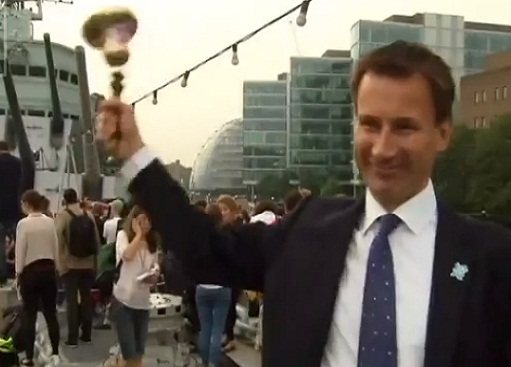Jeremy Hunt Rebuffs Broadband Critics

Flushed with Olympics success, culture says Internet pipes will equal Victorian sewage engineering
Culture secretary Jeremy Hunt has defended the government’s broadband roll-out plans, saying he is “confident” that rural broadband proposals will pass objections from the EU, and Britain will have the best broadband in Europe.
Criticised by a House of Lords Committee for putting speed before coverage, Hunt responded “I plead guilty. And so should we all”. In a speech given at Google’s London Campus site, he said “we simply will not have a competitive broadband network unless we recognise the massive growth in demand for higher and higher speeds.”
Hunt said that concentrating on high speed links to roadside cabinets (fibre to the cabinet or FTTC) would create the conditions where private companies can send fibre into homes and businesses for ultrafast connections. Meanwhile, Broadband Delivery UK (BDUK) will emerge from an EU investigation into state funding of rural broadband, and start delivering in early 2013, he predicted.
Olympic boost for broadband
The Olympics saw overwhelming network demand, said Hunt, with up to 2.8 petabytes of data delivered every day – underlining the need for speed, and making his goal of 24Mbps broadband look sensible.
When the Coalition government began in 2010, Hunt tweaked the Labour government’s broadband proposals slightly, turning a “target” for universal 2Mbps broadband into a “commitment”, and delaying the date till 2015, while bringing forward a plan for 90 percent of the country to have superfast broadband, from 2017 to 2015.
The Lords Communication Committee also criticised the government last month for supporting fibre to the cabinet (FTTC) where optical fibres are terminated in street cabinets, instead of connecting directly to homes and businesses.
Hunt responded that FTTC was not the end of the government’s plans, but he expects the provision of FTTC would provide conditions where private companies could extend fibres for the last few hundred yards.
“Where fibre to the cabinet is the chosen solution it is most likely to be a temporary stepping stone to fibre to the home,” said Hunt. “Indeed, by 2016 fibre to the home will be available on demand to over two-thirds of the population.”
FTTC will provide speeds up to 80Mbps, and sometimes up to 1Gbps, without the massive investment it would take to deliver fibre to homes right away. “If the state were to build a fibre to the home network now, it would potentially cost more than £25bn,” he said. “It would also take the best part of a decade to achieve.”
By stimulating demand for broadband, and building confidence, firms will be helped in their bids to raise venture capital to connect homes and businesses directly, Hunt said. “Perversely the BDUK legacy may not be what it delivers, but what it inspires commercial companies to build and deliver.”
Despite the delay to BDUK, and European objections to the fact that all its money is going to a single provider, BT, Hunt said, “we are confident of getting state aid approval this autumn, after which the procurements will be able to roll out”. He called on local authorities to move quickly when approval was given, so that the majority of projects would be completed by 2015.
The speech got a moderate response, with Thinkbroadband pointing out that Hunt was over-playing his role in broadband plans. “Some historical information appears to be a little skewed,” said Thinkbroadband‘s Andrew Ferguson.
“Mr Hunt takes credit for putting in place plans for superfast to reach 90 percent of the population by 2015, but looking back we can see that the Labour government was working towards the same goal with amazingly the same amount of money. The only difference was that the deadline was 2017 rather than 2015, so we are happy to credit the minister with bringing forward the deadline, but not the vision for creating a faster broadband UK.”
Jeremy Hunt came up with pungent analogies for Britain’s broadband network, comparing it to railways and sewage. Failure would make it like the railways, but success means British broadband could be the equal of the Victorian sewers.
“When the high speed rail network opens from London to Birmingham in 2026 it will be 45 years after the French opened theirs”, said Hunt. “But when it came to sewers, we got it right. In the 1860s Sir Joseph Bazalgette ignored all the critics when putting in London’s sewers and insisted on making the pipes six times bigger than anticipated demand. He could never have predicted the advent of high rise buildings – lifts had not been invented then – but he had the humility to plan for the things he could not predict as well as the ones he could.”
Are you fluent in the language of the Internet? Find out with our quiz!
